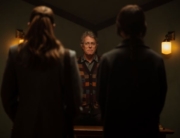The healthily skeptical know that a film entitled Nothing Bad Can Happen ensures that something horrible will certainly occur. Occupying the same squeamish underworld Lars von Trier inhabits, writer/director Katrin Gebbe’s debut relies heavily on resilience—for its main character and its audience.
We meet milk-skinned Tore (Julius Feldmeier) when he’s about to be baptized amongst a tribe of Christian crust punks calling themselves the Jesus Freaks. The group leads a utopian existence, squatting in an abandoned home and organizing seemingly paradoxical church-cum-punk gigs at which everyone is welcome, even nonbelievers.
One such doubter is Benno (Sascha Alexander Gersak), whom the Freaks meet at a rest stop when Tore notices his car trouble. Through the power of prayer, the Freaks miraculously restart the car, peaking Benno’s fascination with Tore and his unshakable faith. During the service/concert, the 40ish Benno witnesses Tore enduring an epileptic fit, and he brings the passed out teen to his home for the evening and the next morning commences a relationship that seems paternal and nurturing… at first.
Nothing subverts the familiar film trope of “the outsider” in which a family’s life is changed by the presence of a stranger. Only this time, it is the family, including Benno’s wife Astrid (Annika Kuhl) and her two children, who reveal their malice. As weeks pass at the family’s home, Tore resides in a tent in the yard, tends to every chore he is saddled with, and develops a close friendship with Astrid’s teenage daughter, Sanny (Swantje Kohlhof). He is part of the family, though his strangeness and unwavering piety perplex everyone that encounters him. Benno slowly begins a regimen of abuse, at first grounded in humiliation and eventually torture, designed to break Tore’s faith. Though Tore has opportunities to escape this cruelty, he sees his misfortune as a test sent by God, his suffering proving the ultimate devotion.
There is nothing easy about watching this film. From moment one, we know something terrible is going to transpire, both due to the ironic title and the brilliant score, which sparingly utilizes thumping, battle-march drums atop wordless scenes. No domain Tore exists in is comfortable. The audience knows two worlds: that of the religious followers with rattails and the sadistic realm of Benno and company. There is no comfort to be had, no reprieve for the viewer, so I’d suggest you prepare yourself.
Feldmeier’s Tore is heartbreaking throughout. He looks like a crazed blond angel, some mixture of a cherub and Huckleberry Finn whose demeanor is fragile and kind. Watching the tragedy that befalls Tore is doubly hard due to his innocence. Gersak is equally convincing in his role as Benno, who, by the film’s end, has devolved into a hardened monster, taking his wife down the same path of sadism.
There are a few holes in Gebbe’s story, namely that Benno’s accomplices seem to fall in his trance of violence a little too easily and without question. It is also difficult to believe that anyone, no matter how determined, would stick around, gluttonous for such punishment.
Despite these nitpicky aspects, what we have here is another example of the cutting-edge that Germany has been mastering as of late. It is certainly not a film you will want to watch again, and even with my steel stomach for the grotesque, I was physically nauseated in one particular scene involving a rotting chicken carcass. But good films aren’t always easy to watch, and easy-to-watch films aren’t always good. This one is certainly worth cringing through.







Leave A Comment